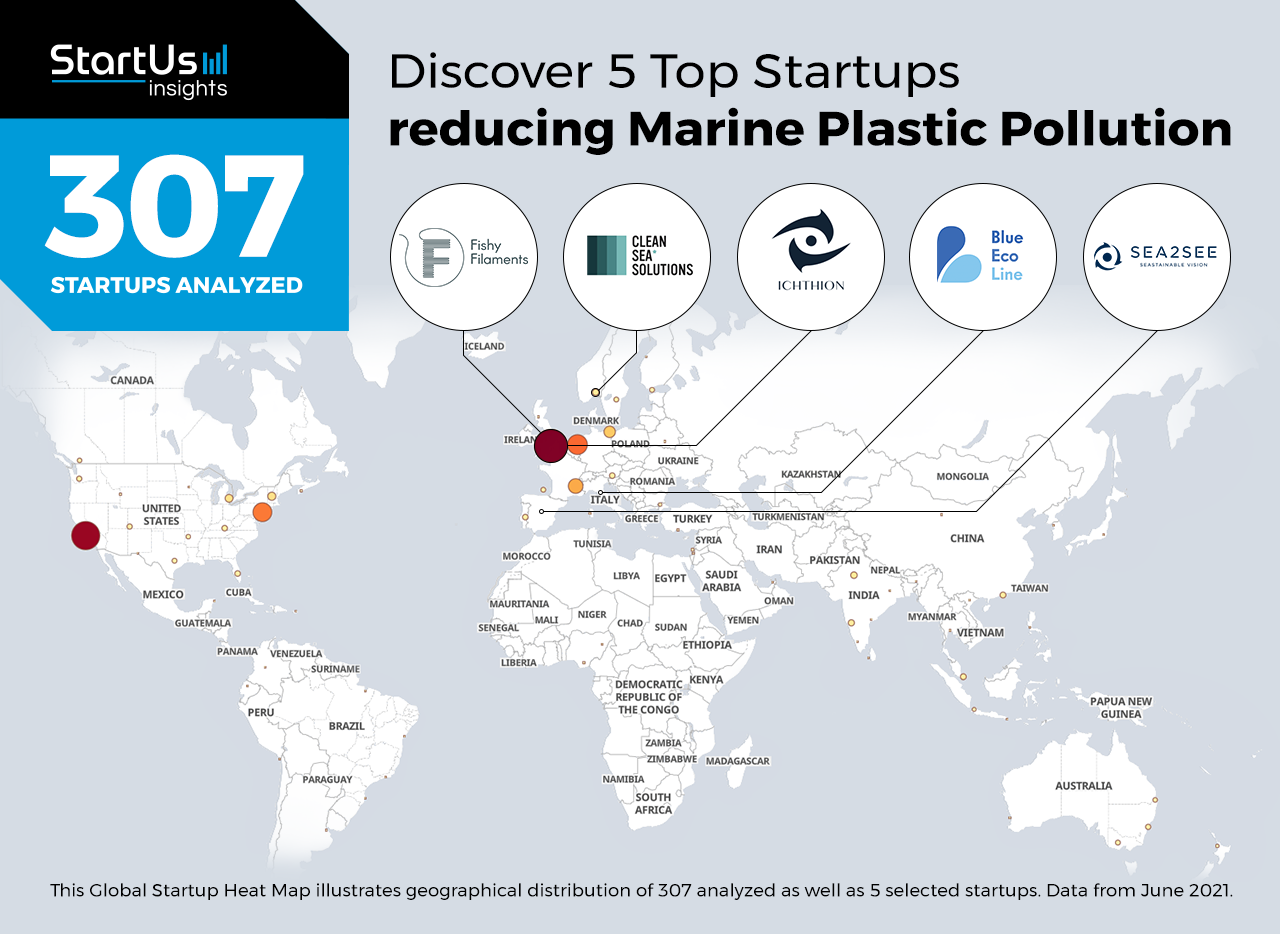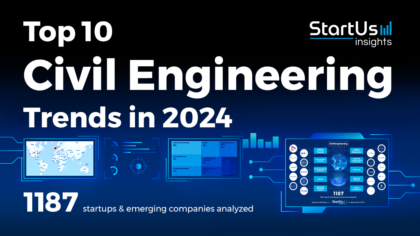Staying ahead of the technology curve means strengthening your competitive advantage. That is why we give you data-driven innovation insights into startup-driven sustainability. This time, you get to discover 5 hand-picked startups reducing marine plastic pollution.
Global Startup Heat Map highlights 5 Top Startups reducing Marine Plastic Pollution out of 307
The insights of this data-driven analysis are derived from the Big Data & Artificial Intelligence-powered StartUs Insights Discovery Platform, covering 2.093.000+ startups & scaleups globally. The platform gives you an exhaustive overview of emerging technologies & relevant startups within a specific field in just a few clicks.
The Global Startup Heat Map below reveals the distribution of the 307 exemplary startups & scaleups we analyzed for this research. Further, it highlights 5 startups tackling marine plastic pollution that we hand-picked based on criteria such as founding year, location, funding raised, and more. You get to explore the solutions of these 5 startups & scaleups in this report. For insights on the other 302 solutions removing marine plastics, get in touch.
Ichthion removes Plastic from Oceans & Rivers
Recent studies suggest that in the next few years, plastic debris in the oceans would weigh more than all the fish. The current techniques of extracting plastic from oceans are not adequate to reverse this outcome. For instance, manual plastic removal with nets remains the standard method but it is inefficient and expensive. Startups overcome this challenge by developing scalable solutions to collect plastics before it enters the ocean.
Ichthion is a British startup that has three different technologies to combat marine plastic, all of which operate in different environments. Azure is an advanced barrier that is deployed in rivers to prevent macro plastic waste from floating into the oceans. Cobalt is a self-cleaning system that uses the relative motion of its host infrastructure to extract microplastics from marine environments. Lastly, Ultramarine is a dynamic system for ships to collect large volumes of plastic whilst preventing high marine collateral.
Fishy Filaments recycles Marine Plastics into a 3D Printing Filament
Ghost fishing gear accounts for a great proportion of macro plastics and marine debris in the ocean. Tons of fishing nets and gear are discarded or lost in the ocean every year, contributing to marine plastic pollution. Fortunately, the nylon that commercial fisheries use to make fishing nets is made to very high standards. Hence, startups upcycle the nylon to make commercial products out of waste.
British startup Fishy Filaments makes 3D printed filaments by recycling marine plastics. The startup aims to create a sustainable solution for fishing communities by converting end-of-life fishing gear into commercially viable items with a wide range of applications. Their 3D-printed filaments find applications for artists and product developers and are also suitable as raw materials for heavy industries.
Blue Eco Line blocks Plastic Waste with Automated River Cleaner
Major quantities of marine plastic have terrestrial origins and reach the oceans through river systems. It is harder to extract plastic once it enters the ocean. Startups leverage artificial intelligence (AI) and big data to develop solutions that trace plastic waste in river bodies. Such solutions also reduce the build-up of waste deposits in coastlines.
Blue Eco Line is an Italian startup that offers a river cleaner system to blocks plastic waste in rivers from entering the sea. The startup’s River Cleaner uses image recognition to independently identify the presence of waste and extract it from the water. Further, the startup’s waste monitoring system, River Eye, uses high-resolution cameras to identify and classify floating waste. A neural network distinguishes between plastic and organic waste through recorded images. The solutions enable governments and municipalities to tackle water pollution in cities’ water bodies.
Sea2See upcycles Marine Plastics into Consumer Products
Plastic bags, six-pack rings, cigarette butts, and other debris in water bodies pose a serious threat to marine ecosystems. However, collecting and recycling marine plastics produce raw materials for manufacturing new products. Startups create scalable solutions to upcycle marine plastics and reduce marine pollution. Such solutions also facilitate sustainability in polluting industries such as fashion and packaging.
Sea2See is a Spanish startup that upcycles marine plastics to make sustainable eyewear and watch straps. The startup makes optical frames with 100% recycled marine plastic waste and abandoned fishnets. The startup collects plastic waste in collaboration with fishermen and creates awareness about plastic contamination in oceans. This also facilitates the creation of a circular economy for the fashion industry.
Clean Sea Solutions removes Marine Plastic using Electric Drones
Marine pollution is the fastest growing environmental problem in the world. Marine plastics sink to the sea-bed and, over a period of time, break down into microplastics. As a result, it is critical to take steps to prevent the inflow of plastic debris from reaching the open oceans. Startups tackle this problem by leveraging automatic drone-based plastic waste collection systems.
Norwegian startup Clean Sea Solutions develops a modular floating dock, AquaPod, to collect and store plastic waste. The startup also offers the Cleaning Drone V1, an autonomous electric drone to removes marine plastic waste floating on and just below water surfaces in ports, canals, rivers, and other marine environments. Further, the startup is building the Aqua Drone for autonomous floating waste collection, using a combination of computer vision and remote sensing to avoid hurdles. The autonomous solutions help national and local authorities deal with plastic pollution and preserve a clean marine environment.
Discover more Sustainability startups
Sustainability startups, such as the 5 examples highlighted in this report, focus on removing marine plastics to preserve and restore important marine ecosystems using technology. While all of these technologies play a major role in reducing marine plastic pollution, they only represent the tip of the iceberg. To explore more sustainability technologies, simply get in touch to let us look into your areas of interest. For a more general overview, you can download our free Industry Innovation Reports to save your time and improve strategic decision-making.









